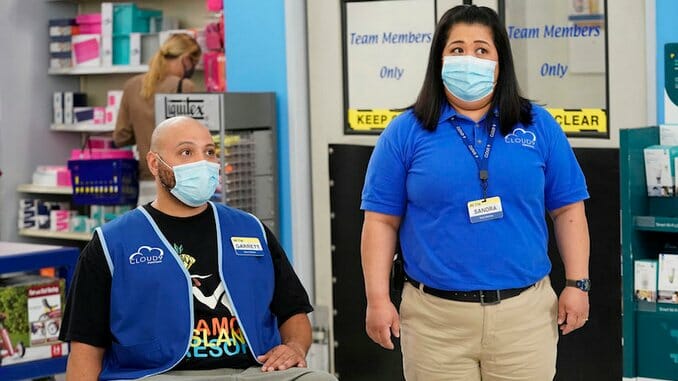How Superstore Continues to Meaningfully Spotlight America’s Most Overlooked Workers
It’s the only series fit to tackle current issues, because it’s the only series showing people truly affected by them.
Photos Courtesy of NBC
We’re all familiar with the workplace comedy. In the mid 2000s, we saw a shift in the type of humor we saw on TV—as we increasingly spent more and more time at work than at home, sitcoms drew less on domestic mishaps and more on relationships made on the clock. The Office codified the genre while centering on Steve Carrell’s hapless regional manager Michael Scott, a character Amy Poehler would later iterate on in Parks and Recreation with her equally naive yet more immediately likeable Leslie Knope.
Going back and watching these shows in 2020 feels a little off, largely because they suggest a work environment that doesn’t adequately mirror the offices of today. Nick Offerman’s staunchly libertarian Ron Swanson barely ruffles the feathers of his more liberal coworkers. Michael unfairly outs a gay office worker and consistently tiptoes around offending nearly every minority, getting off the hook because his intentions “come from a good place.” But stranger still is how relatively few problems each character in these shows face in their work life. Parks Department employees don’t freely discuss their wages, but nor do they struggle to make ends meet despite being relatively low-level bureaucrats assumedly making modest to less-than-desired salaries.
But in 2015, NBC picked up the America Ferrera-led Superstore. The show easily could have fallen into the same trappings of The Office and Parks and Recreation, especially given its creator, Justin Spitzer, worked as a co-executive producer and writer on The Office. But the show instead decided to go for something different. Ditching the mockumentary style perhaps to more closely resemble the then hyper-popular Brooklyn 99, Superstore is filmed like a glossy, well-lit Target ad. And yet, this network sitcom is better equipped to speak to this modern moment more than any other current series.
My first observation on watching the pilot was just how open the set really is—the characters working at Cloud 9 get nary a moment of privacy other than brief, languorous interludes in the breakroom. At any given moment, Amy (America Ferrera) could be interrupted by a helpless customer eager to know the difference between toothbrush brands—or perhaps, more curiously, looking for shovels, tarps, and bleach. Their high public visibility is, at times, oppressive, lampooned hilariously with interstitials of chaos going on around the store: women shopping with hunting rifles strapped to their backs, children throwing ceramic plates against the floor, men trying on swim trunks in the middle of the store.
The show had a rocky start despite boasting an immediately likable cast. Early plotlines were formulaic and predictable: Glenn (Mark McKinney), the affable Christian store manager, sought out Mateo (Nico Santos), a gay floor employee, for help designing a same sex wedding display. Hilarity was then guaranteed to ensue as Glenn dances around offending Mateo as well as gay customers. But then things started to change. The show’s first season ends dramatically as Cheyenne (Nichole Sakura), a pregnant teen, goes into labor while on the clock. The finale ends with a visit from a union buster as the employees attempt to find some kind of financial relief for Cheyenne.
This is where the show found its stride—the absolute absurdity of working in a corrupt, hyper-corporate big box store. In the second season, the focus quickly shifted from benign, strained personal relationships to the shared struggle all the workers face while employees at Cloud 9. Each has particularly low morale, seeing their jobs as dead end or temporary, except for Glenn, his militant assistant manager Dina (Lauren Ash), and college dropout Jonah (Ben Feldman). Jonah often acts as a foil to the rest of the employees, being more clued in to leftist labor principles and a strong sense of justice, but is perceived as “slumming it” given his sometimes snobbish attitude, well-off background, and his love of NPR.
-

-

-

-

- Curated Home Page Articles By Test Admin October 21, 2025 | 3:10pm
-

- Curated Home Page Articles By Test Admin October 21, 2025 | 2:57pm
- Urls By Test Admin October 21, 2025 | 2:57pm
- Curated Home Page Articles By Test Admin October 21, 2025 | 2:55pm
-

-

-

-

-

-

-

-

-

-

-

-

-

-

-

-

-

-

-

-

-

-

-

-

-

-

-

-

-

-

-




































